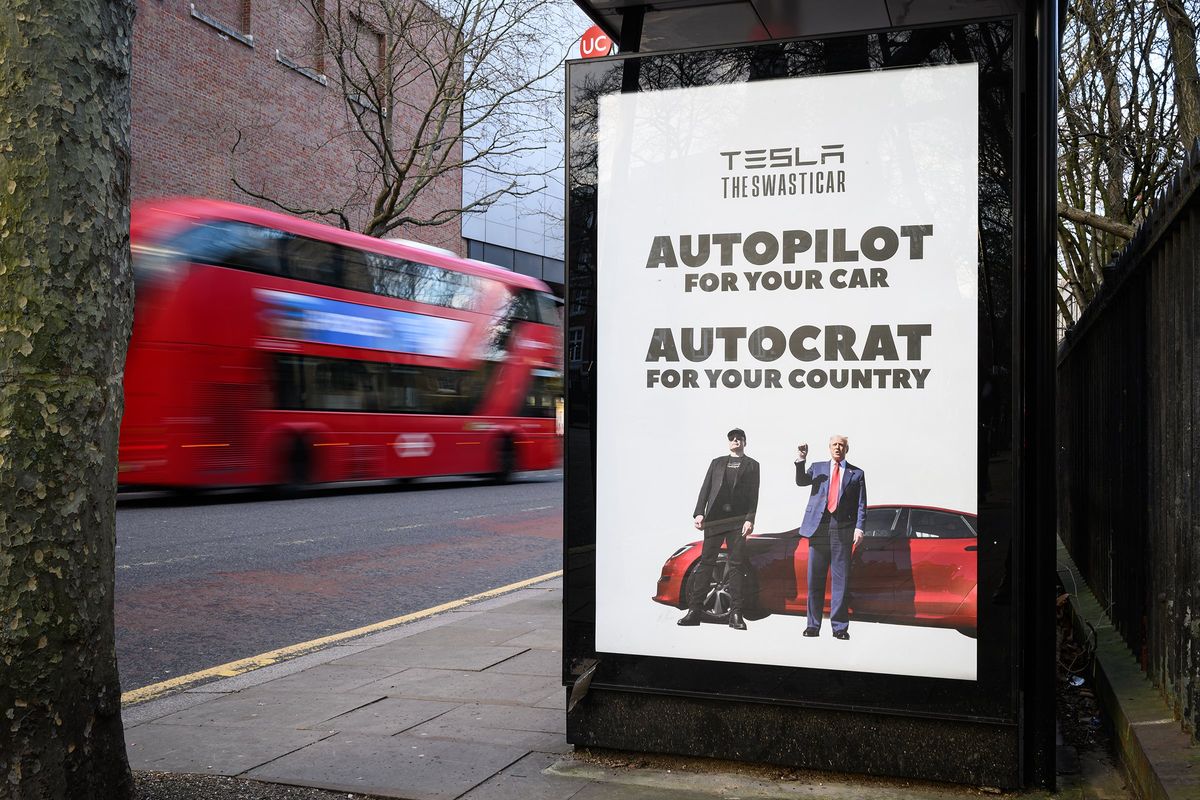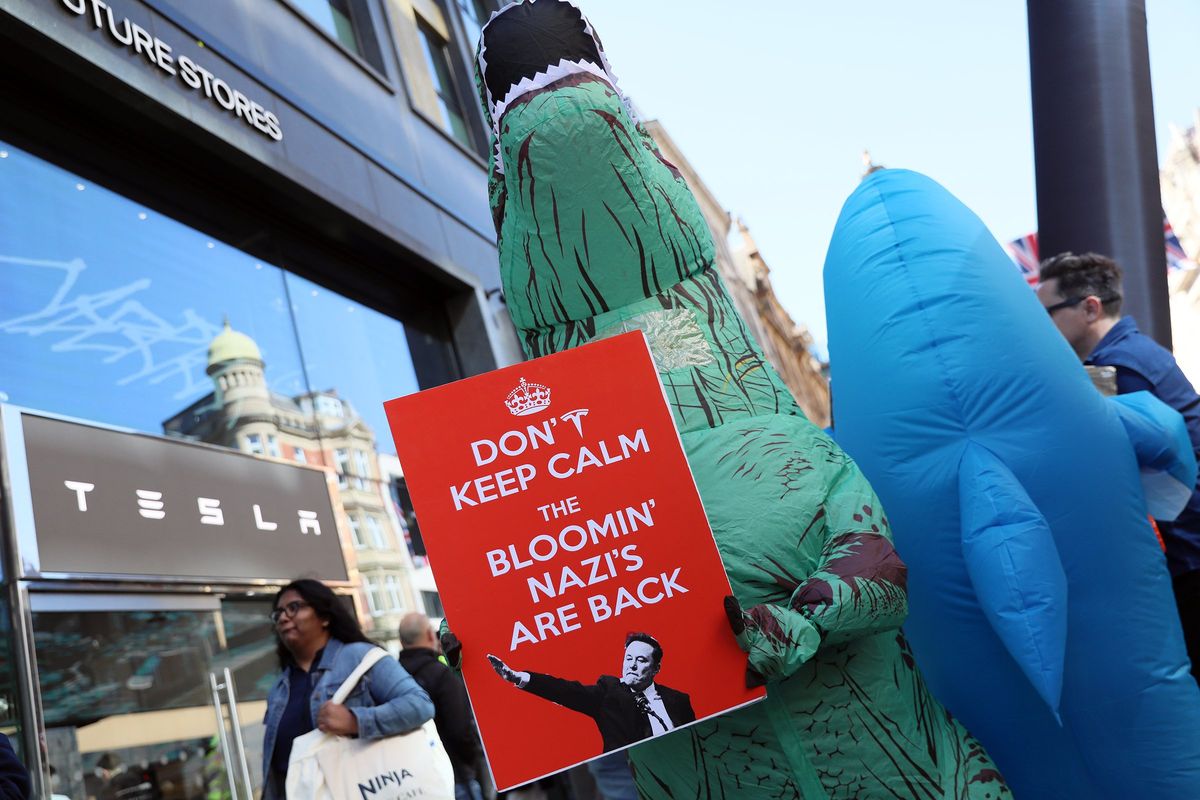‘0 to 1939 in 3 seconds’: Why anti-Elon Musk satire is flourishing in Britain
The latest in a series of posters critical of billionaire Elon Musk is displayed after being unofficially installed on a bus shelter on March 12 in London. (Leon Neal)
LONDON – The mischievous posters began appearing all over London in the past two months.
On the side of an East London bus stop, one of them shows Elon Musk, the world’s richest man, emerging from a Tesla’s roof with his hand pointing upward in a straight-armed salute. “Goes from 0 to 1939 in 3 seconds,” the ad reads. “Tesla. The Swasticar.”
Another mock ad shows Musk and President Donald Trump in front of a red Tesla with the words: “Now With White Power Steering.” In North London, a fake movie billboard blares: “The Fast and the Führer,” with a picture of Musk saluting beside a Tesla with a DOGE license plate, a reference to the budget-slashing federal agency he currently leads on behalf of Trump.
“Parental Guidance,” warns the billboard, put up by a group calling itself Overthrow Musk. “Tesla’s CEO is a far-right activist. Don’t give him your money.”
Across the British capital and in several European cities, Musk’s signature business has become the target of the same kind of political anger that has fueled vandalism of Tesla cars in the United States and sometimes violent protests at his dealerships.
There have been some instances of unruly protests and vandalism in Europe. But much of the anti-Musk sentiment has taken the form of political satire, of the kind that has flourished in Britain since at least the 18th century.
Just outside Berlin, a group called the Center for Political Beauty used high-power lights to project the word “Heil” onto the side of a Tesla factory so that it read “Heil Tesla,” along with a picture of Musk saluting during a speech in Washington. In Italy, street art depicts Musk taking off a mask to show Adolf Hitler’s face underneath. The words “Elon Mask” appear above the picture.
“There’s never been a target exactly like this,” said John Gorenfeld, a software engineer who helped start a London-based group called Takedown Tesla. The group has organized protests of several dozen people for the past several weeks. They hold posters along freeways that say “Honk if you hate Elon.” And they have printed bumper stickers for Tesla owners with phrases like “Don’t make the same mistake” and “Pre-2020 Model.”
“Nobody who is that rich and powerful has behaved that outrageously,” Gorenfeld said. “There’s something campy and ridiculous about Musk’s brand of toxicity. And it opens up a real space to ridicule.”
In Europe, Musk is not just a faraway example of American wealth and power. Over the past year, he has become a frequent political meddler, often weighing in on behalf of far-right causes on X, his social media platform, where he has 218 million followers.
In Britain, Musk is known for sharing misinformation about a child rape scandal and calling for Prime Minister Keir Starmer to be jailed. He has called for the release of Tommy Robinson, a far-right, anti-immigrant agitator who is in prison for contempt of court. And he criticized the seven-year sentence of a neo-Nazi who incited and took part in anti-immigrant riots over the summer.
The small anti-Musk groups that have popped up around Europe have the same basic goal: Tank Tesla’s stock price and sales as a way of sending a message to Musk and other super-wealthy people who are thinking of promoting far-right politics around the world. Some groups declined to be interviewed about their actions, citing concern about becoming a target of Musk’s ire on social media. But others were more open about their aims.
“The point of this is to show Musk and other billionaires that they are vulnerable and can’t act with impunity,” said Ben Stewart, a founder of a British satirical activist group called Led by Donkeys, which worked with the Center for Political Beauty to project Musk’s image on the Berlin factory. “We have to harness global public opinion to push back.”
Organizers think it’s working. Tesla’s stock price has almost halved since its high in December, around the same time that Musk began his high-profile role overseeing the firing of government workers and slashing federal agency budgets. This past week, Tesla reported a 13% drop in sales compared with a year ago.
“What they’re trying to do is put massive pressure on me, and Tesla I guess, to you know, I don’t know, stop doing this,” Musk said recently in Wisconsin, where he was campaigning for a state Supreme Court candidate.
And yet, he added with a shrug, “Long term, I think Tesla stock’s going to do fine, so maybe it’s a buying opportunity.”
The protesters who spoke about their aims said they wanted to challenge Musk’s influence without resorting to the vandalism that the billionaire has called out in the United States as “coordinated violence against a peaceful company.”
Theodora Sutcliffe, a London resident who helped organize Tesla Takedown, said none of the people she works with are participating in violence. Instead, they have sought to find other ways to capture public attention.
At one of their protests, a wavy, 20-foot balloon man who vaguely resembled Musk saluted into the air. At other times, Sutcliffe and her fellow protesters have left flyers on the windshields of Tesla cars.
“Once upon a time, Teslas were cool,” one flyer says. “Now, sadly, that’s not the case. Driving a Tesla and using Tesla chargers means you’re propping up Elon Musk, a man who promotes climate deniers and fossil-fuel junkies.”
“If you want to go viral in the U.K., you have to be smart, I think,” Sutcliffe said. “That’s our sense of humor normally.”
The anti-Musk efforts in Berlin were led by Philipp Ruch, artistic director for the Center for Political Beauty, a German activist group. In an interview, he said that much of the anger at Musk in Germany stems from the billionaire’s support for the country’s far-right party, the Alternative for Germany.
“The first day that the administration comes in, he does the Hitler salute,” Ruch said. “This is something we couldn’t tolerate, politically and artistically.”
Ruch performs many of his protests by “overwriting” one image with another. At the Tesla dealership, he used lights to superimpose his words and images of Musk for a new artistic creation. (He said police are now investigating his efforts, which were visible for about an hour.) Pictures of the building spread widely on social media.
Other efforts have gone viral, too.
There are mock car air fresheners called “Musk-B-Gone” that promise to cover “the stench of fascism.”
And cardboard cutouts of Musk and Trump, thanking Tesla owners for their support when they top up their cars at the company’s supercharger lots.
“There are some people who are coming at Musk as though he’s some sort of passive agent of Trump and that really, this is just another way of getting to Trump,” Sutcliffe said. “There’s other people who perceive Musk as somebody who’s a unique type of threat that we really haven’t seen before in terms of his economic control and control of the information space.”
This article originally appeared in The New York Times.

